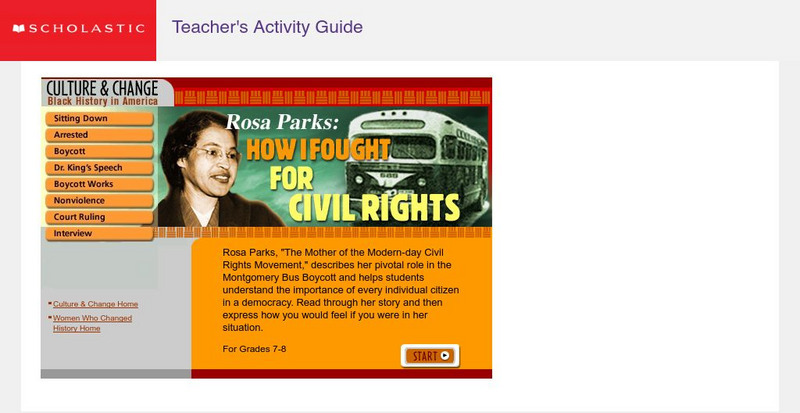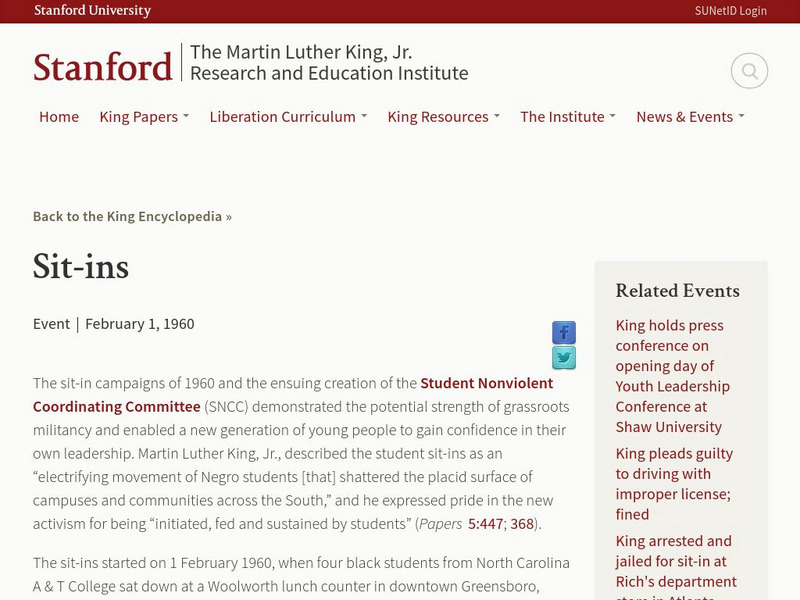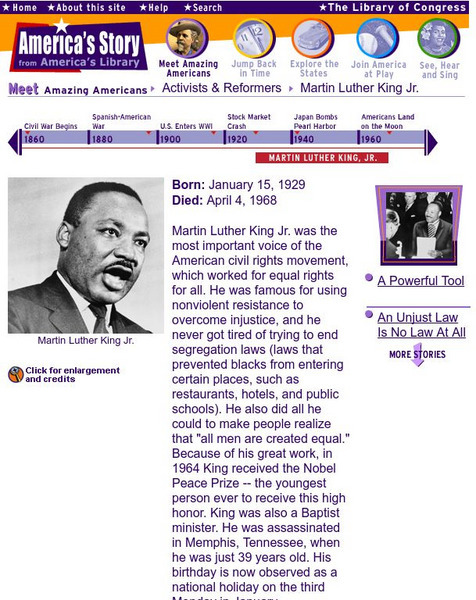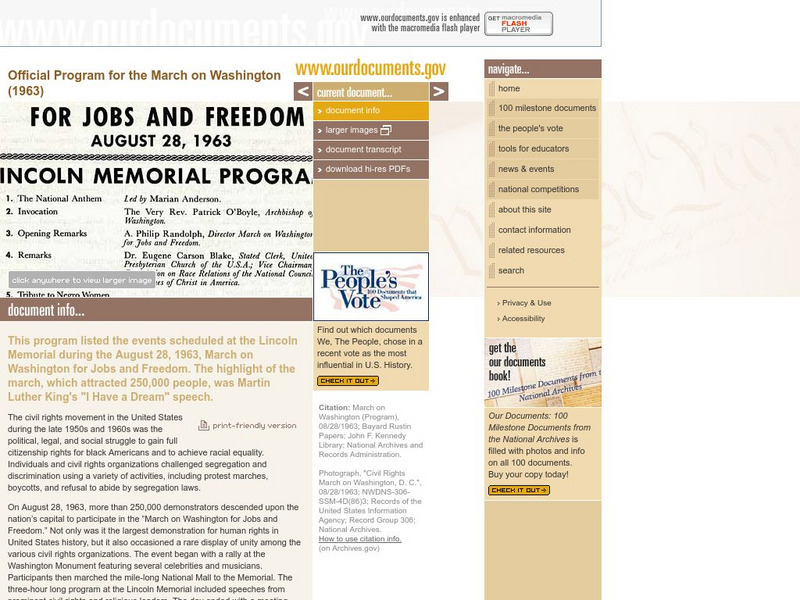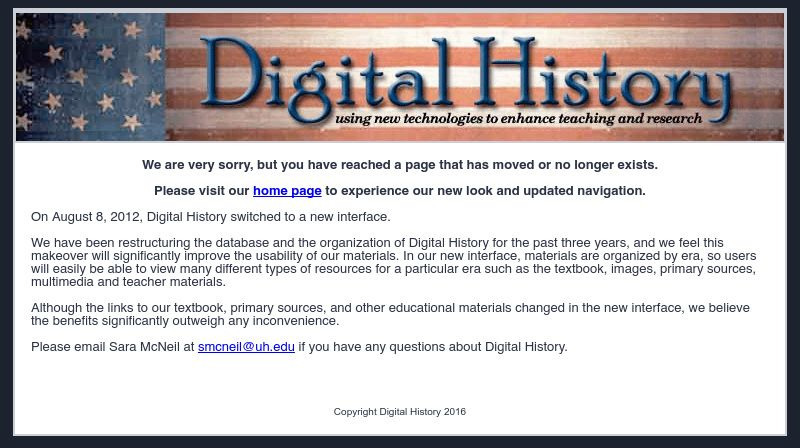Digital History
Digital History: Freedom Now
When four African American North Carolina Agricultural and Technical College students refused to leave the lunch-counter at the F.W. Woolworth store in Greensboro they started the first non-violent, "sit-in" movement. Although the...
Other
Historical Marker Database: Mc Crory's Civil Rights Sit Ins Friendship Nine
Historical sign marks the building where the Friendship Nine refused to leave the McCrory's lunch counter. Short history is provided along with related websites. This group was the first to refuse bail and thus began the Jail No Bail...
The History Cat
The History Cat: u.s. History: The Civil Rights Movement
Outlines Martin Luther King, Jr.'s work as a civil rights leader from the beginning of the Montgomery Bus Boycott in 1955 up until his assassination in Memphis on April 4, 1968. Describes the different protest movements, including the...
Scholastic
Scholastic: Teachers: Rosa Parks: How I Fought for Civil Rights
Learn about African American Rosa Parks and her non-violent protest against racial discrimination. This resource addresses Parks' actions in the context of American race relations at the time. Read an interview with Parks about how she...
Bill of Rights Institute
Bill of Rights Institute: Texas v. Johnson
This Landmark Supreme Court Cases and the Constitution eLesson focuses on a case involving expressive conduct, and what is for many a deeply cherished symbol of America, the U.S. flag. In a closely divided (5-4) ruling, the Supreme Court...
PBS
Pbs: American Experience: Freedom Riders
PBS collects and summarizes the stories of the freedom riders, who, in 1961, challenged segregation in the American South. Includes video clips from the documentary, interactive timeline of key locations and events, biographical...
PBS
Pbs Learning Media: March on Washington Flyers
These 1963 flyers announce the speakers and issues for the March on Washington; from the Birmingham Civil Rights Institute.
Ducksters
Ducksters: Civil Rights for Kids: African American Civil Rights Movement
Kids learn about the history of the African-American Civil Rights Movement including segregation, Jim Crow laws, protests, Martin Luther King, and the passage of the Civil Rights Act on this site.
Social Studies for Kids
Social Studies for Kids: Rosa Parks: Civil Rights Pioneer
Learn interesting facts about Rosa Parks, the "Mother of the Civil Rights Movement" in America.
Khan Academy
Khan Academy: "Massive Resistance" and the Little Rock Nine
Read about the famous civil rights protest in Little Rock, Kansas in 1957 when nine African American students attempted to enter Central High School on the first day of school. Despite the presence of federal troops at the school for the...
Stanford University
Mlk and the Global Freedom Struggle: Sit Ins
Read about the organization behind the sit-ins at southern businesses, first in Greensboro, North Carolina, then spread throughout the south. Of interest is the prominence of student-led protest. Be sure to look at the related events and...
Other
Letter From Birminghham Jail [Pdf]
This letter shares Martin Luther King's reflections about his involvement in peaceful demonstrations. The letter provides historical information about the plight of African Americans throughout history and why he and others are so...
PBS
Pbs: Independent Lens: Strange Fruit, the Film
Website on Strange Fruit, a documentary film about the history and legacy of the protest song "Strange Fruit." Includes the lyrics and audio for the song.
Other
New York University: Labor Arts
Numerous collections of cartoons, buttons, posters, murals, photographs, and similar artifacts, all pertaining to history of American labor, especially its drive to organize and its history of protest. Stretches back to the earliest days...
Library of Congress
Loc: Women of Protest: Photographs From National Woman's Party
Find a collection of photographs from the Library of Congress that show the militant tactics of the National Woman's Party in its support of woman's suffrage. In addition to the photographs, there are articles about this branch of the...
Google Cultural Institute
Google Cultural Institute: Sharpeville Massacre
Illustrated story explores the tragic event that took place in South Africa in 1960 when police opened fire on a "peaceful" protest against the pass laws thus becoming known as the Sharpeville Massacre.
Library of Congress
Loc: America's Story: Martin Luther King
This article gives a brief overview of the life of civil rights leader Dr. Martin Luther King Jr. while discussing the concept of non-violent resistance.
US National Archives
Our Documents: Official Program for March on Washington(1963)
Contains a copy of the original program for the March on Washington that featured Martin Luther King. Provides a summary of the civil rights movement at that time.
Digital History
Digital History: Black Nationalism and Black Power
There were two methods of protesting discrimination of African Americans during the Civil Rights Movement: follow Martin Luther King, Jr. or Malcolm X. Find out about the Black Panther Party, Black Nationalism, and Black Power.
NBC
Nbc Learn: Finishing the Dream: 1962 1963: Standoffs
A collection of archival video clips highlighting the efforts of African Americans to fight racial segregation in education. Looks at the struggle of James H. Meredith to attend the University of Mississippi in 1962, and the resulting...
National Humanities Center
National Humanities Center: Toolbox Library: Marching, Making of African American Identity: V. 3
This resource by the National Humanities Center discusses the role of physical protest in the civil rights movement. Its primary focus, the print "Freedom Now," by Reginald Gammon (1921-2005), depicts the massing of bodies in the name of...
Khan Academy
Khan Academy: Us History: 1945 1980: Sncc and Core
Read about the two civil rights groups that organized nonviolent protests during the 1950s and 1960s.
National Humanities Center
National Humanities Center: Toolbox Library: Singing, Making of African American Identity: V. 3
An analysis of the role music played in the civil rights movement. The well known spiritual, "We Shall Overcome," is referenced as playing a key role in supporting this movement.
Gilder Lehrman Institute of American History
Gilder Lehrman Institute: History Now: Securing the Right to Vote: Selma to Montgomery Story
[Free Registration/Login Required] Lesson plan asking this essential question: "What conditions created a need for a protest march from Selma to Montgomery in 1965 and what did that march achieve?"





